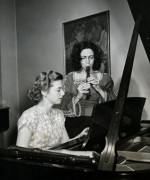Column Name
Title
1948
November 30, the Festival of Contemporary French Music opened. Compositions representative of significant trends in 20th-century French music were presented in a series of four concerts of chamber, orchestral, opera, and choral works. The Juilliard Opera Theater staged Milhaud’s Le Pauvre Matelot, a lament in three acts by Cocteau, and Poulenc’s secular cantata Le Bal Masqué, which was preceded by a screening of René Clair’s film Entr’acte scored by Satie. René Leibowitz’s Quintet for Wind Instruments and Jean-Louis Martinet’s Orphée received their United States premieres. Festival participants included Juilliard students, guest artists Dorothy Dana, Paul Smith, and Alvin Wolfson, as well as faculty members Vincent Abato, Suzanne Bloch, Frederic Cohen, Vernon de Tar, Jean Morel, Frederick Prausnitz, Robert Shaw, Frederic Waldman, and Beveridge Webster.
Body
1958
November 4, composer Karlheinz Stockhausen spoke at Juilliard on “New Instrumental and Electronic Music.”
1970
November 19, a newly established Collegium Musicum gave its debut concert in the Juilliard Drama Workshop. Under the direction of Fritz Rikko, the period-instrument ensemble performed a program of music by Pergolesi, Handel, Marais, and Graun. Soloists were soprano Judith Hubbell and viola da gamba players August Wenzinger and Hannelore Mueller from the Schola Cantorum in Basel, Switzerland.
1987
November 13-16, the Juilliard Dance Ensemble presented a program of four premieres that were commissioned by the School. It was the first time in the history of the Dance Division that four works were commissioned simultaneously for performance on the same program. The commissioned works were Benjamin Harkarvy’s Prom Story, David Parsons’s Monday Morning, Kei Takei’s Light, Part 24: Chanting Hills, and Francis Patrelle’s Reeks with Class! Moses Pendleton’s Bonsai was also performed.





